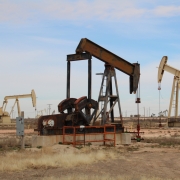By Cynthia Gonzalez and Rev. Clara Sims
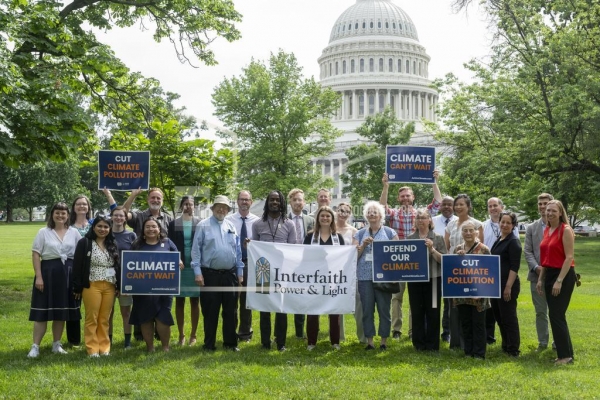 We had a busy day on Wednesday, May 8, meeting with four congressional offices. We met with the staff from the offices of Senator Ben Ray Lujan, Senator Martin Heinrich, Representatives Gabe Vasquez and Theresa Ledger Fernandez. Due to conflicts with scheduling, we were not able to meet with the office of Representative Melanie Stansbury, however, were able to stop by and drop off a package with information and in the age of zoom, we look forward to a virtual meeting soon.
We had a busy day on Wednesday, May 8, meeting with four congressional offices. We met with the staff from the offices of Senator Ben Ray Lujan, Senator Martin Heinrich, Representatives Gabe Vasquez and Theresa Ledger Fernandez. Due to conflicts with scheduling, we were not able to meet with the office of Representative Melanie Stansbury, however, were able to stop by and drop off a package with information and in the age of zoom, we look forward to a virtual meeting soon.
The staff at each of the offices were very welcoming. We had positive exchanges with each of the staffers, who listened and acknowledged our concerns. Since they are champions on the issues of climate and environmental justice, we asked for their support on specific bills and initiatives and shared with them about our ongoing work with communities of faith and conscience.
Urging Congress to preserve important EPA standards
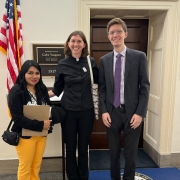
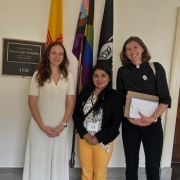 A main focus in each meeting was our immediate concern with deployment of the Congressional Review Act (CRA). Congressional Review Acts seek to roll back President Biden’s administrative rules on EPA standards for things such as methane emissions, other air pollutants, and much more. As a recent “State of the Air Report” highlighted, counties across NM and the El Paso region are suffering from worsening air conditions – frontline communities in the Permian and Four Corners region as well as large urban centers like Bernalillo County.
A main focus in each meeting was our immediate concern with deployment of the Congressional Review Act (CRA). Congressional Review Acts seek to roll back President Biden’s administrative rules on EPA standards for things such as methane emissions, other air pollutants, and much more. As a recent “State of the Air Report” highlighted, counties across NM and the El Paso region are suffering from worsening air conditions – frontline communities in the Permian and Four Corners region as well as large urban centers like Bernalillo County.
In our meetings, we delivered postcards from community members highlighting the need to protect the EPA. We need an EPA with strong standards so they can not only enforce present rules but also declare where air pollution standards are already being violated across our state and region. We are grateful that all offices shared our concern with protecting these vital administrative rules to protect the immediate and long-term health of our sacred communities.
Supporting US participation in International Climate Finance effort
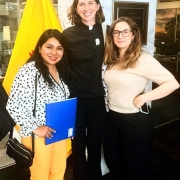
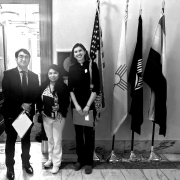 With a longer time-frame in mind, we also asked our legislators to support the United States participation in International Climate Finance (ICF). As Pope Francis expressed so poignantly in his encyclical letter Laudato Si, our country bears a “disproportionate responsibility” to lead internationally and help communities globally whose lives are already changing drastically due to climate change.
With a longer time-frame in mind, we also asked our legislators to support the United States participation in International Climate Finance (ICF). As Pope Francis expressed so poignantly in his encyclical letter Laudato Si, our country bears a “disproportionate responsibility” to lead internationally and help communities globally whose lives are already changing drastically due to climate change.
Presently the U.S. is behind on the relatively small financial commitments already made. Not only do these commitments need to be greater in proportion to our financial capacity to provide aid to other countries, we also need to do right by the promises already made.
In each meeting, we shared stories and experiences from communities of faith and conscience across New Mexico and the El Paso region, naming especially our increasing concern for the ways extractivism and New Mexico’s legacy as a “sacrifice zone” for industry interests continues to harm us all. We are grateful that each office shared these concerns and acknowledged the need to learn from and work closely with frontline communities and Tribal Nations especially as we seek healing and justice for our climate and common home.
We appreciate the opportunities we had to meet with the congressional offices and look forward to collaborating in the future on the many ways we are called to be leaders guided by moral integrity and love in action for this sacred creation into which we are woven.
(Cynthia Gonzalez is an IPL New Mexico-El Paso board member from El Paso Texas. Rev. Clara Sims is assistant executive director).

